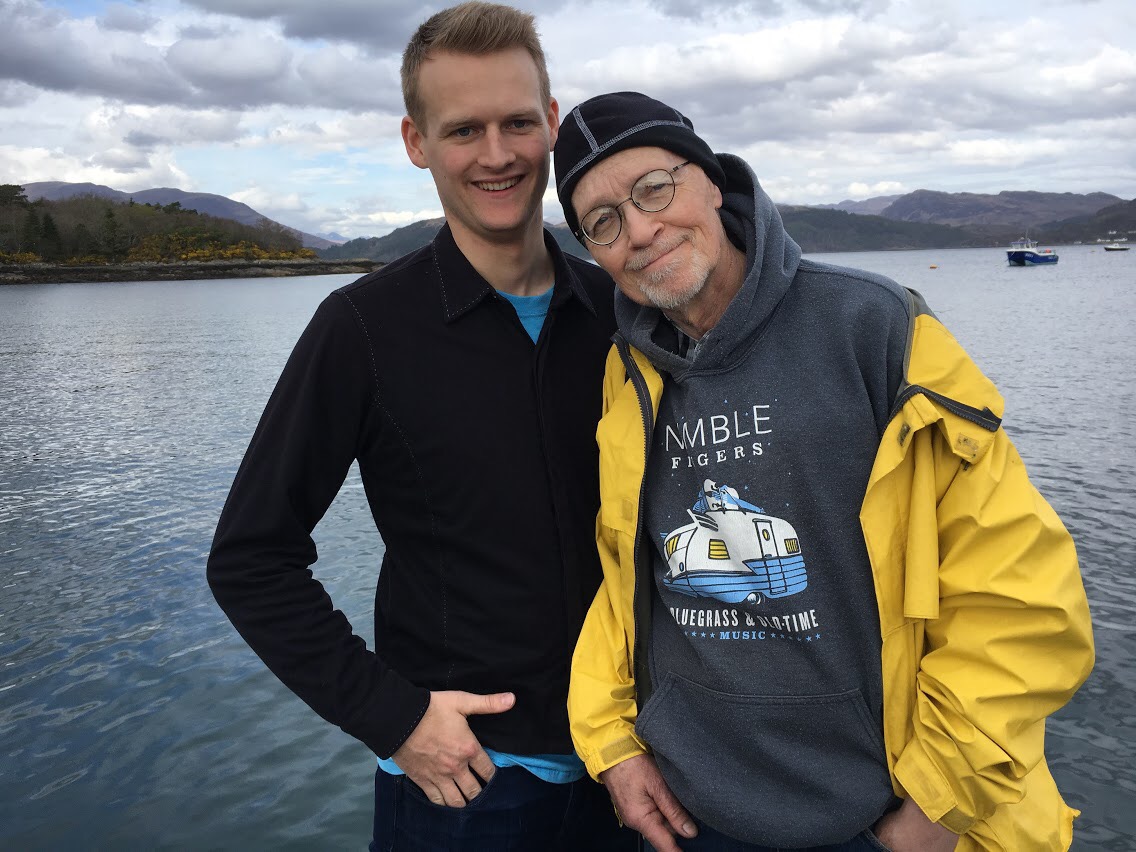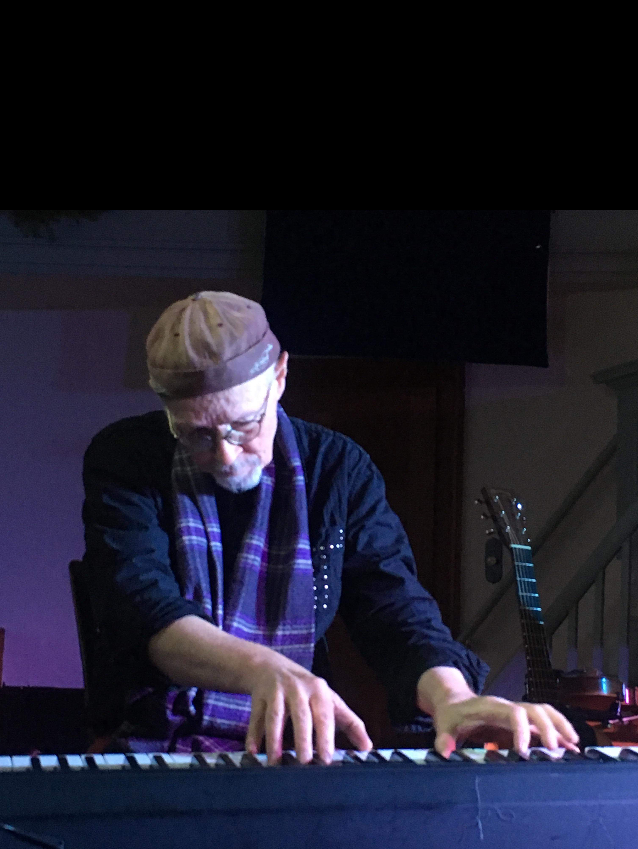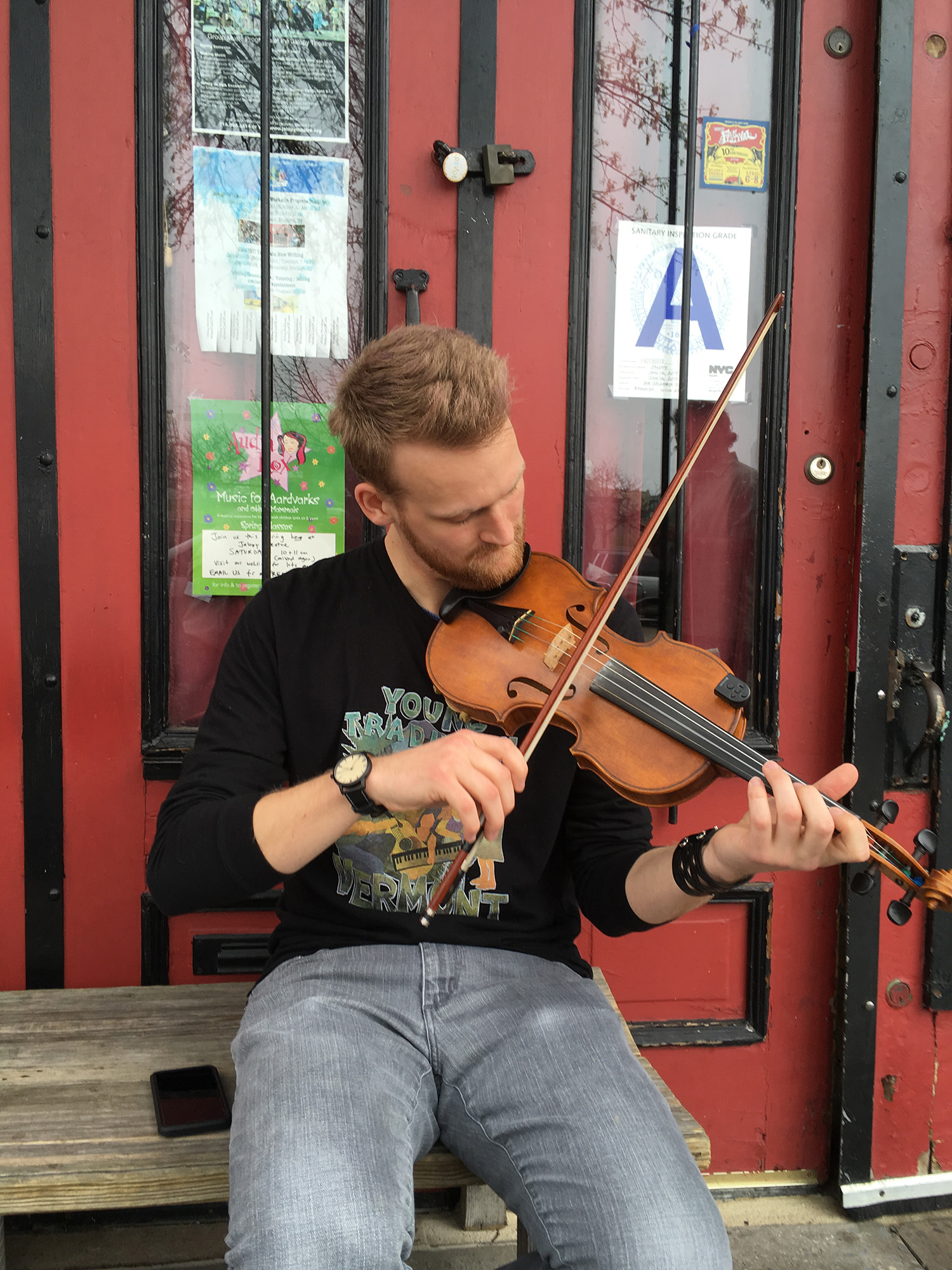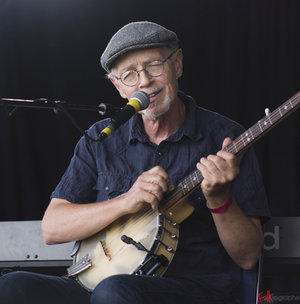Oliver Scanlon & Pete Sutherland

The Conversation: Contemporary Fiddle and Keyboard Music
Saturday, May 8, 2021, 7:00 PM
Pete Sutherland, Keyboard
Oliver Scanlon, Fiddle
If you enjoy this concert please consider sending a donation to Piano by Nature. You can mail a check to Piano by Nature, 32 Champlain Ave., Westport, NY 12993. Or donate online through the Donate button below (using your Paypal account or credit card).
On May 8th, 2021, Piano by Nature will be embarking on another first. This time, one which embraces a type of music often performed on front porches, in living rooms, and in community dance halls. When many of us think of folk music, we visualize a guitar, fiddle, banjo, or mandolin, etc., but not necessarily the piano. But according to Scott Alarik in his online article “Folk Piano?” (see full article here and below), the piano has been a common instrument for all kinds of music beyond classical since the mid-19th-Century, covering everything from rhythm in string bands, saloon music, boogie-woogie, and more. At that time there were pianos in a majority of households and over 4,000 manufacturers of pianos in the US. But in 1890, the availability of inexpensive and portable guitars from the Sears and Montgomery Ward catalogue gave traveling musicians just what they needed, and the movement towards smaller string-based folk ensembles began in earnest. By the Great Depression, people began associating folk music with strings-only ensembles.
Pete Sutherland hails from the folk tradition and plays not just one, but many of the instruments of his craft, including the piano! Pete has graciously offered to curate a special evening of American roots music featuring piano, fiddle, and banjo. This special event will consist of music both old and new, especially for our Piano by Nature audiences. This will be a glorious and spirited home-grown celebration of Vermont folk music!
Piano by Nature proudly presents VT folk musicians, Pete Sutherland and Oliver Scanlon in a FREE Zoom Concert for all who wish to join us on Saturday, May 8th at 7:00 p.m. We will be joined by the artists for a pre-concert meet-and-greet and post-concert Q&A session. All you have to do is sign-up to our email list (see sign up at the bottom of any page on our website!). Once you are on our mailing list, you will receive a link for access to the performance on the day of the concert. You can ‘press play’ on the link we send you via email any time after 6:30 p.m. If you can’t join us right on time, we can let you in at any point during the presentation without interrupting the music. Additionally, if you cannot attend for any reason, we will post the concert video on this page for two weeks following the performance—you can watch, listen, and dance to this spirited music as many times as you’d like! We hope to see you on the 8th and look forward to experiencing this very special event together!
Meet the Artists

Pete Sutherland
A warm-voiced singer-songsmith and accomplished multi-instrumentalist, Pete is known equally for his potent originals and his intense recreations of age-old ballads and fiery fiddle tunes.
The American Festival of Fiddle Tunes said Pete “covers the map and shines with a …pure spirit which infuses every bit of his music and cannot fail to move all who hear him.”
He has been on staff at dance and music camps coast to coast and is a widely known year-round teacher and performer at home. Sutherland is a veteran of many touring and recording groups including Metamora, Rhythm in Shoes, The Woodshed Allstars, Woods Tea Company, Ira Bernstein’s Ten Toe Percussion, and he is a founding member of the long-running ‘contradance jamband’ The Clayfoot Strutters, as well as the inter-generational folk trio Pete’s Posse.
He is also a producer with over 80 projects under his belt, and a prolific songwriter covered by the likes of Cathy Fink and Marcy Marxer, Jay Ungar and Molly Mason, Nightingale and Altan.

Oliver Scanlon
A soulful multi-instrumentalist and spellbinding composer, Oliver began his journey of musical discovery playing the viola with the Vermont Youth Orchestra when he was nine. Shortly after he was introduced to his mentor Pete and the immense parallel universe of fiddle music!
His keen interest in fiddling led him to seek out further learning and performing opportunities through Mark Sustic’s “Fiddleheads” program, and soon he began attending music camps where he studied various styles with Alan Jabbour, Kimberley Fraser, Andrea Beaton, Eric Favreau, and other master fiddlers.
In 2008, Oliver and a few talented middle school friends formed a group, The Irregulars, a six-piece outfit that has played scores of local dances and festivals and took first prize in the 2011 Young Tradition Vermont talent contest! Then in 2013 he co-founded Pete’s Posse and became the youngest member of Pete’s long-running dance band The Clayfoot Strutters.
He released his solo album “The Pond Jam” in 2014, which was both his senior project before graduating high school and a testament to his passion and artistry. Recognized not only for his mesmerizing playing but also for being a meticulous sound tech, Oliver stays quite busy when not on the road with the Posse!
Please enjoy these video previews of Pete’s Posse!
(Featuring Pete Sutherland, Oliver Scanlon, and Tristan Henderson)
Morpeth Rant Set
Pete’s Posse playing a set for the Fiddle Club of the World (Chicago), 2014
Folk Piano?
Article written by Scott Alarik for the Boston Globe, April 10, 2006
One of the best writers in America,
Pete Seeger
Like a banjo at the opera, the piano can seem strangely out of place in American folk music. Guitars come to mind as folk instruments, along with fiddles, banjos, mandolins, and perhaps the occasional dulcimer. So why is the Lowell Folk Festival, the most traditional of regional summer fetes, toasting the piano?
“Instruments don’t belong to any particular form of music,” says Joe Wilson of the National Council for the Traditional Arts, which programs the music for the festival. “They’re neither classical nor popular nor folk. Pianos, like all other instruments, have taken on regional styles in this country, played in different ways by the ordinary people whose music we celebrate at Lowell.”
In a special homage to American folk piano styles, the festival is presenting Chicago blues and boogie-woogie whiz Daryl Davis; dizzyingly quick Appalachian keyboardist Jeff Little, and Old West virtuoso Dave Bourne, who plays the Gem Saloon’s piano player in the HBO series Deadwood.
Little says it’s often news to people, even in his native Blue Ridge Mountains, that the piano played an important role in Southern mountain music.
“In the 19th century,” he says, “pretty much anyone who could afford a piano had one. They were very common rhythm instruments in early string bands.”
Bourne has become an avid scholar of the piano’s rise and fall in American folk music, just as he has in the ripplingly melodic style of Old West saloon music. He has complained to Deadwood’s producers about their historically inaccurate use of guitar-driven, bluegrass-type string bands. Those kinds of bands did not exist in the 1870’s, when the show is set; though larger saloons might have had a small ensemble featuring piano and fiddles.
The piano was also a mainstay in American homes – and not just wealthy homes, Bourne says. “In the 1860s, ’70s, ’80s, everybody had a piano in their parlor. There were 4,000 piano manufacturers in this country alone. It was such an all-encompassing instrument; you could play anything on it.”
So what happened? In a word, guitars.
Guitars were not an indigenous American folk instrument. They were always played a little in the Southwest, but mostly by Hispanics. It wasn’t until the 1890s, when Sears and Montgomery-Wards offered cheap, sturdy guitars in their catalogs, that it was taken up by itinerant blues musicians, cowboys, farm workers, and other creators of American folk styles. It was much more portable than the piano; and as guitars got bigger, better – and louder – they began replacing the piano as a dominant rhythm instrument.
At the dawn of the 20th century, the fledgling recording industry dealt another blow. According to Bourne, in the first studios, musicians had huddle around a horn-shaped megaphone. The piano couldn’t get close enough, and didn’t record well even when played solo.
Little says many Appalachian string bands at that time replaced rhythm piano with guitar, in order to record better and tour more easily. He can clearly hear the boom-chick piano influence in the way those early guitarists played.
The piano remained more prevalent in African-American music than in most white traditions, says Davis, because it was common in gospel churches, and in barrelhouses and brothels that couldn’t afford bands. Boogie-woogie was actually designed to replicate the full, rocking sound of a combo, with its strutting bass lines, chordal middle passages, and high, quick melody notes.
“Back in the Depression era,” Davis says, “when people couldn’t afford a band, they would hire a boogie-woogie piano player.”
Still, the piano was increasingly regarded as either more of an elite instrument – for classical or highbrow parlor music – or more aligned with commercial music. “It began to be seen less as a people’s instrument, more of a high-toned instrument,” says Davis. “But the piano definitely has a place in American roots music.”
Little learned the Appalachian tunes he plays from guitarists who gathered around his father’s music store in Boone, North Carolina. Among them was legendary picker Doc Watson, who never questioned this kid who wanted to join in on the piano. That’s just not the way folks think in Boone.
“Around home,” Little says, “people sit around playing music together, and don’t think about things like correct instrumentation, or what’s the proper way to do things. Some people say they might not consider me a traditionalist, because I’m playing this kind of music on the piano. But I consider it my tradition, because it’s the music I grew up playing.”
Young Tradition Vermont Essay from Pete Sutherland

When I left behind my growing-up world of piano and trombone lessons, the coordination issues and challenges of marching band and learning guitar from Beatles songbooks and discovered the parallel universe of traditional music, I felt like Alice falling down the rabbit hole. I had few if any actual teachers from then on, stumbling cluelessly but happily from one festival or picking party jam session to another sucking up tunes, aided by my trusty Panasonic machine and a backpack’s worth of 3/$1 cassettes. It’s a wonder those cheap tapes lasted long enough for me to learn the music off of them, but I did have two things going for me from the get-go: a strong peer group to play and learn with, and a series of mentors. These wise folk were musicians and music-lovers of my parents’ and occasionally my grandparents’ generation who were true tradition-bearers, and despite whatever feelings they might have had about my long-haired-hippie appearance, they welcomed me into their homes and their musical lives.
I was (just barely) smart enough then to value these opportunities, but over time I grew smarter. I reckoned that with the passing of my mentors a link to the living past was in danger of disappearing, and that I and my generation of unschooled amateur tune-hunters WERE that link now. Although I had been teaching music lessons off and on my whole adult life, the idea of making a much larger step into the world of active long-term mentoring slowly took shape in my mind.
What is mentoring to me? It goes beyond the transmission of tunes, songs, chord patterns. It’s giving background history through anecdotes and stories. It’s sending notices of concerts by visiting artists and links to YouTube videos. It’s calling a young person up and taking them to a show or a dance. It’s finding opportunities for kids with ability to access the stage or the bandstand at a dance. And beyond all that, it’s maintaining an active listening role for the young person when they have questions or concerns about playing this admittedly weird, under-the-radar music, or are wondering what THEIR place might be in the continuing thread of tradition. Above all it’s about EMPOWERMENT.
As an organization, and a collection of first-class mentors, Young Tradition Vermont in my mind, embodies this skill set. They provide the all-important social piece, workshops, festivals, cultural exchange and camp intensives, access to performance opportunities, outreach to new communities of young learners and more. YTV too is all about empowerment. It is such a great honor and privilege to be part of the mentoring community that YTV does so much to nurture. Burlington and the Northern VT community are empowered many times over. (https://youngtraditionvermont.org/)

